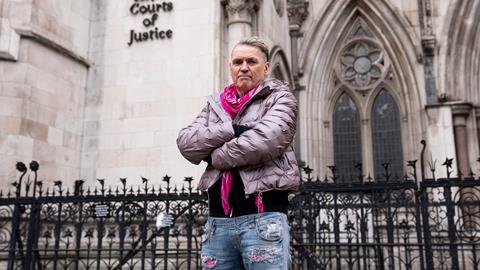The high-profile divorce wrangling between green energy tycoon Dale Vince (pictured above) and his ex-wife Kate finally concluded in the High Court in December. Ms Vince said she was pleased with her hefty award of more than £40m following a long dispute over the division and value of the family assets, but was it really worth it?

Mr Vince bemoaned: ‘My ex-wife walks away from court with £12m less than I first offered her four years ago… along with her legal team she has wasted years of time, not just our own but that of the court and £6m in fees.’ While some will view this as the gripe of a disgruntled ex, his remarks do question the financial and emotional worth of progressing financial remedy proceedings in the court system. Particularly when their situation was a little more nuanced. Mr Vince was pleased with Mr Justice Cusworth’s judgment overall, insisting it was a ‘total vindication of my approach to this case from the very beginning’.
Of course, there was arguably still merit for Ms Vince to pursue her case. Understandably concerned, she alleged that Mr Vince had been ‘disposing’ of millions in matrimonial assets when she should have been entitled to 50% of them. For example, he handed out donations to the Labour party, Cheltenham Muslim Association, and his own charity the Green Britain Foundation, which supports Forest Green Rovers FC. In response, Mr Vince said his donations were made due to a rise in the value of his business.
The judge decided that Ms Vince should receive ‘50% of the marital element of the value in the businesses’, given the ‘extensive contributions throughout the marriage…during which Mr Vince built the majority of his fortune’. However, Mr Justice Cusworth acknowledged that it had taken 34 months to finalise the splitting of the matrimonial pot: ‘While there have not been any undue delays in bringing this case to court, the period is a relevant one in that there has been a significant increase in the valuation of the company over the past three years.’ While Mr Vince’s company, Ecotricity, had significantly grown during that period of separation, ‘it is certainly the present valuation of the company by which the value of the wife’s share should be calculated’.
However, Ms Vince could have received a higher settlement years ago, and saved millions in legal costs, as highlighted by Mr Vince. Financial remedy proceedings through the courts can take much longer than out-of-court alternatives. If disagreements over assets grow or are exacerbated throughout this process, they can take even longer. Delays that have plagued the family court system in recent years show no signs of letting up – going through the court system is likely to be a lengthy, costly process. It is rarely worth it.
Clients will face increased stress and legal costs over many years, when it may have been better to compromise earlier on. While we can only advise our clients and act upon their instructions, we can do more as a profession to make non-court dispute resolution options the norm, not the exception. We also have a duty to try to relieve pressure on our struggling legal system.
Non-court dispute resolution can facilitate speedier agreements (months as opposed to years through the courts). Crucially, we must educate clients that these processes are designed to help divorcing couples in contention over their assets – court is not the only answer if you are in a heated tussle with an ex. For example, private financial dispute resolution, mediation and negotiating through solicitors are all sensible options which are likely to result in a settlement. If these fail, court can still be avoided through family arbitration.
As well as bypassing family court delays, these processes are likely to be much more cost-efficient for the client, hold logistical benefits, and of course can mitigate the emotional harm suffered by a client and their family due to a lengthy separation and a combative court process. These alternative options are more likely to create a positive and cooperative ongoing relationship with an ex-spouse which will help future co-parenting by avoiding the adversarial legal process in court. The focus is much more on collaboration. Clients’ lives and their families do not need to be put on hold for years on end.
While the Vince v Vince judgment did achieve a fair outcome that was favourable for both parties, it took years of litigation to achieve this.
One can understand why clients want to pursue court action if they deem a potential outcome unfair, but many clients, unlike their lawyers, have never experienced the power and positivity that non-court dispute resolution options can offer.
As a profession, our service must extend to seeking to minimise the financial and emotional burden on our clients and their families. We must offer the full scope of legal options to help them find a resolution by the most effective, rewarding and emotionally advantageous means.
Julian Ribet is founding partner at Ribet Myles, London
































2 Readers' comments